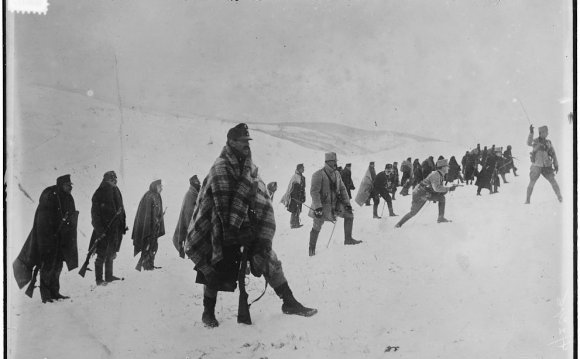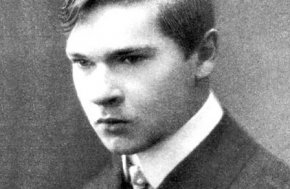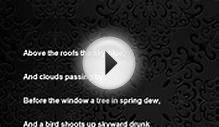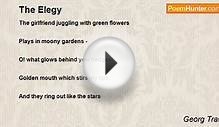
 Georg Trakl is an important lyric poet in German literature regarding the very early twentieth century. Experts connect their make use of different modern artistic moves, in which he is regarded as the major article authors setting the dark, introspective tone that later affected the course of German expressionism. Affinities with imagism are also mentioned in Trakl’s strikingly visual design. Additionally, the dreamlike flow of photos inside the poems has indicated to some commentators a compositional method like the automated writing of this surrealists, with whom Trakl in addition shared a preoccupation with violence, perversity, and death. Trakl’s best literary association, however, is with the French symbolists regarding the nineteenth century, mostly Arthur Rimbaud, whoever disordered and conflict-ridden wizard is considered incarnated into the Austrian poet.
Georg Trakl is an important lyric poet in German literature regarding the very early twentieth century. Experts connect their make use of different modern artistic moves, in which he is regarded as the major article authors setting the dark, introspective tone that later affected the course of German expressionism. Affinities with imagism are also mentioned in Trakl’s strikingly visual design. Additionally, the dreamlike flow of photos inside the poems has indicated to some commentators a compositional method like the automated writing of this surrealists, with whom Trakl in addition shared a preoccupation with violence, perversity, and death. Trakl’s best literary association, however, is with the French symbolists regarding the nineteenth century, mostly Arthur Rimbaud, whoever disordered and conflict-ridden wizard is considered incarnated into the Austrian poet.
Of good significance in Trakl’s very early home life in Salzburg was his close relations with his sis Grete. Experts regularly identify the girl as the motivation for “the cousin, ” a multifaceted symbolic figure in the poems. Trakl attended a Catholic primary school, while receiving Protestant religious training; he was an unsuccessful student and in the end dropped out of school. Later, but he entered the University of Vienna for training as a pharmacist, a career which facilitated their lifelong using drugs. Soon after leaving the institution he was drafted in to the Austrian army and assigned toward medical corps. Time for civil life, Trakl discovered work in a pharmacy, did not adapt to the program of working life, and reenlisted within the military. In 1912, while stationed in Innsbruck, he met Ludwig von Ficker, editor of Der Brenner. Ficker became friend and mentor to Trakl the remaining several years of their quick life, publishing the poet’s work frequently in the literary log. Trakl died of a self-administered, though possibly accidental, medicine overdose in a Polish medical center while dealing with his fight experience during World War I.
Experts agree totally that, though Trakl had been composing poetry from an early age, their most useful work times from final couple of years of his life, displaying a noticeable development from his attempts before 1912. Private torment and an unrelieved sense of horror and disintegration dominated the earlier poems. The tone of Trakl’s later poems is much more impersonal and uncertain. In these works Trakl transcends the severe subjectivity of his former poetic self to universalize their existential sight. Some experts describe this brand new high quality in Trakl’s mature poems as a mythic objectivity, while confronting the paradox that this poet’s world is essentially exclusive, resembling that of a schizophrenic. Critical analysis of Trakl’s work has actually uncovered its disjointed, fragmentary nature, summarizing it as an accumulation often-repeated symbols and motifs without consistent meaning. These poems, however, are credited with a consistency of mood and attitude that unifies them into a cohesive, though nonrational, statement. In essence, they form the poet’s protest from the corrupt, fallen problem of humankind.
Within 2 yrs Trakl were able to produce the poems that spot him being among the most crucial and original poets of this German language. His language was simple and easy obvious, even yet in interpretation, resembling the task of Hoelderlin, with powerful and accurate imagery, darkly brooding sensitiveness, and an adept experience for color. He penned about death, decay, and doom, hiding himself in lyrical metaphor plus the ambiguity of his pictures. Trakl saw the whole world collapsing around him and taking him with it; and even though their poetry is overwhelmingly unfavorable, critics find in it a gesture of affirmation. Internal proof the poems and statements created by Trakl have indicated to a lot of commentators that he ended up being a Christian or at least gave vocals to Christian doctrine, and thus balanced their visions of damnation with all the probability of ultimate redemption. He described poetry as “imperfect penance” for “unabsolved guilt.” Other experts see inside much more positive part to his work the impact of pantheistic views obtained from Hoelderlin. Herbert Lindenberger published in Georg Trakl, “The lofty stance, the cosmic range, in addition to haunting music of Trakl’s poetry now mark him, with Rilke, as probably the last great representative of what might be known as the sublime custom in German.”
Job
Supported in Austrian Army medical corps; blogger, c. 1900-14.
Bibliography
- Gedichte, 1913.
- Sebastian im traum, 1915.
- Die dichtungen, 1918.
- Aus goldenem kelch: Die Jugenddichtungen, modified by Erhard Buschbeck, Muller (Salzburg), 1939.
- Gesamtausgabe(accumulated works), modified by Wolfgang Schneditz, three amounts, [Salzburg], 1938-49.
- Decline: Twelve Poems, translation by Michael Hamburger, Latin Press (St. Ives), 1952.
- Twenty Poems, translation by James Wright and Robert Bly, Sixties Press (Madison), 1961.
- Selected Poems, edited by Christopher, interpretation by Robert Grenier as well as others, J. Cape (London), 1968.
- Dichtungen und briefe, Muller, 1969.
- In the Red Forest, 1973.
- Poems, translation by Lucia Getsi, Mundus Artium Press (Athens), 1973.
- Winter Night: Four Prose Poems, translation by David J. Black, Thunder City Press (Birmingham), 1979.
- Georg Trakl: A Profile, edited by Frank Graziano, Logbridge-Rhodes (Durango), 1983.
- Tune associated with the West: Selected Poems of Georg Trakl, translation by Robert Firmage, North Point Press (san francisco bay area), 1988.
- Autumn Sonata: Selected Poems of Georg Trakl, interpretation by Daniel Simko, Moyer Bell (Mt. Kisco), 1989.
- Craorag, Carbad (Baile Atha Cliath, Ireland), 1991.
- Salzburg, pictures by Oskar Anrather, Residenc Verlag (Salzburg, Austria), 1994.
RELATED VIDEO











